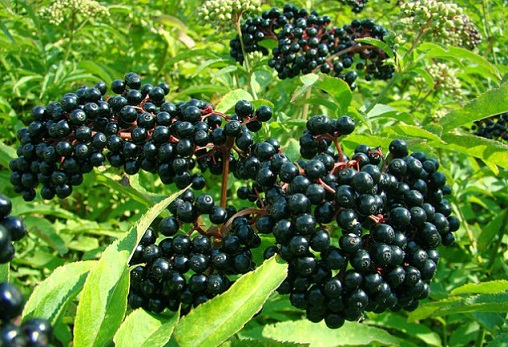Nikhil Prasad Fact checked by:Thailand Medical News Team Dec 03, 2024 4 months, 1 week, 3 days, 19 hours, 25 minutes ago
Medical News: A recent study has spotlighted the potential of elderberry extract in managing testosterone deficiency syndrome (TDS). Researchers from KOSABIO Inc., Sahmyook University, and Hurum Co., Ltd., Republic of Korea, have found that elderberry extracts can enhance testosterone levels while reducing its breakdown. The findings bring hope for an effective and natural remedy for TDS, a condition often associated with aging men.
 Elderberry Extracts Show Promise in Restoring Testosterone Levels
Understanding Testosterone Deficiency
Elderberry Extracts Show Promise in Restoring Testosterone Levels
Understanding Testosterone Deficiency
Testosterone plays a vital role in men’s health, affecting muscle mass, sexual function, mood, and energy levels. Typically, testosterone production peaks around the age of 30 and declines by approximately 1-2% annually. The rapid depletion of this hormone can lead to TDS, which manifests through symptoms like erectile dysfunction, fatigue, decreased bone density, and depression. This
Medical News report highlights how elderberry extracts might provide a safer alternative to synthetic testosterone therapies, which often come with side effects like cardiovascular risks and prostate issues.
In their study, researchers explored the effects of elderberry extract, named KSB191, on aged male rats. They observed its influence on testosterone synthesis pathways, focusing on enzymes critical to testosterone production. KSB191 not only stimulated these enzymes but also curbed the action of enzymes that degrade testosterone.
How Elderberry Works
The study identified key compounds in elderberry extract, including rutin and fructose-leucine. These active components exhibited antioxidant properties, mitigating oxidative stress in Leydig cells of the testes - a primary cause of diminished testosterone levels. By restoring mitochondrial function in these cells, the extract effectively promoted testosterone production.
When administered to aged rats, KSB191 significantly elevated both total testosterone (TT) and free testosterone (FT) levels. Free testosterone, the bioactive form, showed a noteworthy increase in groups receiving higher doses of the extract. The data demonstrated a dose-dependent improvement, with the highest dose restoring testosterone levels to nearly those observed in younger animals.
Impact on Sperm Motility
Sperm health, crucial for male fertility, also benefited from KSB191. The extract improved sperm motility by enhancing the internal testicular environment. High-dose groups showed a significant 14% improvement in motility compared to untreated older rats. These findings underline elderberry’s broader potential in enhancing reproductive health.
Safety and Side Effects
Unlike traditional testosterone replacement therapies (TRTs), KSB191 showed no adverse effects on critical markers like prostate-specific antigen (PSA) levels. Concerns over prostate health, often linked with increased testosterone, were alleviated as prostate size and PSA levels remained stable or even improved. Additi
onally, the extract exhibited no toxicity, with liver and kidney function markers staying within normal ranges.
Mechanisms at Play
The study elaborated on how KSB191 optimizes testosterone pathways. It increased the activity of enzymes like 3β-HSD and CYP17A1, which are pivotal in synthesizing testosterone. Simultaneously, it suppressed 5α-reductase and CYP19A1, enzymes responsible for converting testosterone into less active forms or other hormones. This dual action ensures sustained levels of bioavailable testosterone, essential for managing TDS symptoms effectively.
Conclusions and Future Implications
The findings suggest that KSB191 could emerge as a promising alternative to conventional TRTs. Unlike synthetic options, which temporarily boost testosterone without addressing its production, KSB191 improves the body's ability to produce and maintain testosterone naturally. This could potentially reduce the need for lifelong medication, offering a sustainable solution for aging men.
While these results are preliminary and derived from animal models, they lay the groundwork for human clinical trials. Should similar outcomes be observed in humans, elderberry extract could redefine the management of TDS, blending efficacy with safety.
In conclusion, elderberry extract offers a natural and promising approach to managing testosterone deficiency. By targeting the root causes of TDS - oxidative stress and enzyme imbalances—it holds the potential to restore vitality and well-being in aging men.
The study findings were published in the peer-reviewed journal: Nutrients.
https://www.mdpi.com/2072-6643/16/23/4169
For the latest on Herbs And Phytochemical, keep on logging to Thailand
Medical News.
Read Also:
https://www.thailandmedical.news/news/indonesian-medicinal-plants-offer-hope-for-treating-erectile-dysfunction
https://www.thailandmedical.news/news/thailand-medical-researchers-leverage-3d-printing-to-produce-tablets-containing-mucuna-extract-to-treat-erectile-dysfunction
